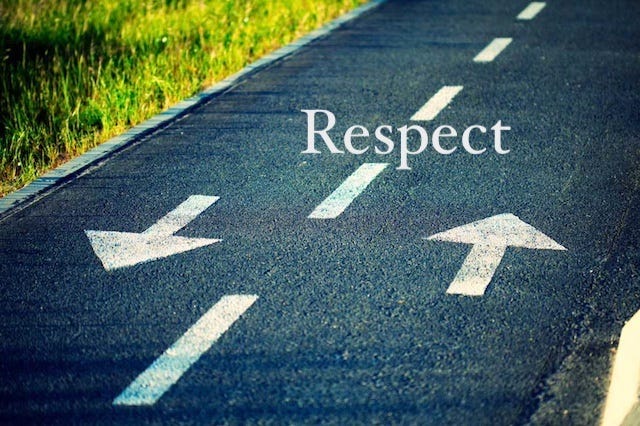The Golden Rule: Treat your kids the way you want to be treated
The Golden Rule applied to parenting - even when your kids aren't at their best
Parenting Matters #80
By: Catherine Lynch and Glenn Collins
Dear awesome parent,
Do you need one-on-one help implementing our strategies? Book a free half-hour call HERE and we’ll give you actionable strategies you can put in place immediately to bring peace and harmony back to your family.
Want to join us talking about these strategies and how to implement them in a small group setting? Join us live on Wednesdays from 12-1 EST. We’ll answer your questions, customize our strategies to your unique situation, and help you get your family back on track. Here's the Zoom link.
And now, on to our topic today:
How to apply the Golden Rule to parenting without losing respect, authority, or influence:
The Golden Rule:
Do unto others as you would have them do unto you.
Paraphrased into modern English and applied to parenting:
Sounds great! Sounds true! Words to live by!
But. (And there’s always a but! 😕)
When you try to apply it to parenting, you inevitably come up against some version of these objections and questions:
There have to be rules that are different for my kids than for me.
If I apply the Golden Rule, can I still discipline or punish them?
If I apply the Golden Rule, will they still respect me?
If I apply the Golden Rule, can I get them to do anything they don’t want to do, like put down the iPad, clean their room, and do their homework?
To all these objections, we state an emphatic Yes.
Yes, you can apply the golden rule and still be the leader they need you to be. You can discipline them. They will still respect you. And they’ll put down the iPad, clean their room, and do their homework.
Ironically, you’ll get more respect, better obedience, and happier kids when you are more consistent about applying the Golden Rule.
It’s easy to apply the Golden Rule when your kids are well behaved. But what about the rest of the time? When they’re misbehaving or driving you nuts? It’s more challenging, but that’s when it’s more important than ever to apply the Golden Rule.
Here’s how: The Golden Rule isn’t about you and your kids having the same rules. It’s about your attitude and mindset. It’s about applying respect, empathy, kindness, and curiosity to your interactions with your kids. Even, and especially, when they’ve disobeyed and/or disrespected you and you need to discipline them.
(Remember, “discipline” means teach them. Not beat, belittle, or shame them.)
Let’s start with Respect.
Why should you be respectful when your kid isn’t respectful to you?
Because you’re the role model and the leader of your family. The words, attitudes, and actions you want them to copy - well… they get them from you. You set the example.
Because kids are people and people deserve respect. And respect is a two-way street. You give some, you get some. You get back what you put out. Not perfectly, of course. But in general.
Because “Do what I say, not what I do” is a thing of the past - and it didn’t work back then, either. Actions speak much louder than words because we are their role models and they do what we do.
Because you’re concerned about the wrong thing: you’re worried they don’t listen to you, but the truth is they never stop watching you. 👀
How do you treat your kids with respect when they’ve disobeyed and/or disrespected you?
Choose your attitude. Respect is an attitude, and it shows up in your actions and body language.
Choose your words and tone of voice.
Wait until the time is right - address a situation when you’re calm enough to show up the way you want to: with respect for them as a person.
Give them grace because they’re not as mature as you are and their self-control is still a work in progress.
Lead with curiosity, not judgment
Now, on to Empathy.
Why do we treat our kids with empathy, even when they’ve disobeyed?
Because…
We’ve all been there. We’ve disobeyed and had a good reason for it - or at least thought we did.
When kids feel better inside, they act better. Your kids have feelings, and feelings are the real reason we all act the way we do. When you empathize with your kid, you let them know that what they’re feeling is important to you, not just their behavior.
Your kids aren’t as mature as you are. Their development, their emotional regulation, and their life experience are all less than yours.
There’s more going on than you know. So show empathy, because they struggle with things we don’t even know about.
How do we treat our kids with empathy?
We put ourselves in their shoes.
We don’t judge them or shame them.
We get curious. We ask questions like “What else was going on?”
We say things like “Oh no!” and “That’s crazy!” and “You wanted….. to happen instead.”
And now, Curiosity.
Why should we be curious even when they’ve disobeyed?
Because it’s your golden opportunity to learn more about why your kid does what they do. What they think. How they reason. How they feel. When you know what’s going on behind the scenes, you have an opportunity to clear up the misperceptions, misunderstandings, and beliefs that don’t serve them.
How to be curious:
Don’t jump to conclusions.
Use your curious voice, not your blaming/shaming/demanding answers voice.
Ask open-ended questions. (Not yes/no questions.)
Let them tell their side of the story.
Say things like “Set the scene for me. What else was going on? Tell me more about that. How were you feeling?”
Finally, Kindness.
Why on earth should we be kind when our kid has disobeyed or disrespected us?
Mostly, because we love our kids and we want them to experience kindness. But also because every kind act counts toward making the world a better place for all of us. Even when someone has done something wrong.
What does kindness look like?
Give them the benefit of the doubt.
Treat them like their thoughts, feelings, and dreams matter.
Wait til you’re calm before addressing their bad behavior or deciding on a punishment.
Mostly, it looks like respect, empathy, and curiosity, even, and especially, when you don’t feel like it.
Full confession: We certainly weren’t kind to our kids 100% of the time, and no one expects you to be either! Aiming for kindness is what’s important, because at the other end of the kindness spectrum is blame, shame, and emotional damage. You don’t want to be there! So if you aim for kindness, you might not get there every time, but at least you won’t end up in the blame and shame zone.
Bonus: What kindness doesn’t mean:
Many people misinterpret kindness, at least when we’re talking about kindness as it relates to parenting.
Just for the record: Being kind doesn’t mean you can’t be upset with them - and let them know about it. It doesn’t mean you have to be nice all the time, give them what they want, or let them do whatever they want. And it certainly doesn’t mean you can’t discipline or punish them!
Home Practice:
Talk to your spouse and identify the most common areas of your family life where you’re not using the Golden Rule. Choose just one of them to address this week keeping the above questions and strategies in mind. Let us know how it goes!
Whenever you're ready, there are 3 ways we can help you:
Are you struggling with your kid's device use? Book a free half-hour call HERE and we’ll give you actionable strategies you can put in place immediately to bring peace and harmony back to your family.
Need help implementing the parenting strategies in our newsletters? Join us live on Wednesdays from 12-1 EST. We’ll answer your questions, customize our strategies to your unique situation, and help you get your family back on track. Here's the Zoom link.
Do you need private, one-on-one help putting our parenting strategies into practice? Book a free half-hour call HERE and we’ll personally guide you to your next step you can put in place immediately to bring peace and harmony back to your family.
Does the Golden Rule apply to Jasmine?
Jasmine, hoping we don’t throw her off the bed. Hoping the Golden Rule applies to her, too 😁.







